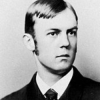Charles Horton Cooley

Charles Horton Cooley
Charles Horton Cooleywas an American sociologist and the son of Thomas M. Cooley. He studied and went on to teach economics and sociology at the University of Michigan, and he was a founding member and the eighth president of the American Sociological Association. He is perhaps best known for his concept of the looking glass self, which is the concept that a person's self grows out of society's interpersonal interactions and the perceptions of others...
NationalityAmerican
ProfessionSociologist
CountryUnited States of America
book men curiosity
In most cases a favorite writer is more with us in his book than he ever could have been in the flesh; since, being a writer, he is one who has studied and perfected this particular mode of personal incarnation, very likely to the detriment of any other. I should like as a matter of curiosity to see and hear for a moment the men whose works I admire; but I should hardly expect to find further intercourse particularly profitable.
book reading past
A person of mature years and ripe development, who is expecting nothing from literature but the corroboration and renewal of past ideas, may find satisfaction in a lucidity so complete as to occasion no imaginative excitement, but young and ambitious students are not content with it. They seek the excitement because they are capable of the growth that it accompanies.
american-sociologist effective fact general human organized social
The general fact is that the most effective way of utilizing human energy is through an organized rivalry, which by specialization and social control is, at the same time, organized co-operation.
children home evil
Simplicity is a pleasant thing in children, or at any age, but it is not necessarily admirable, nor is affectation altogether a thing of evil. To be normal, to be at home in the world, with a prospect of power, usefulness, or success, the person must have that imaginative insight into other minds that underlies tact and savoir-faire, morality and beneficence. This insight involves sophistication, some understanding and sharing of the clandestine impulses of human nature. A simplicity that is merely the lack of this insight indicates a sort of defect.
greed consciousness consumerism
It is partly to avoid consciousness of greed that we prefer to associate with those who are at least as greedy as we ourselves. Those who consume much less are a reproach.
blow men self
One of the great reasons for the popularity of strikes is that they give the suppressed self a sense of power. For once the human tool knows itself a man, able to stand up and speak a word or strike a blow.
doe imposing seems
There is hardly any one so insignificant that he does not seem imposing to some one at some time.
political reform negative
The idealist's program of political or economic reform may be impracticable, absurd, demonstrably ridiculous; but it can never be successfully opposed merely by pointing out that this is the case. A negative opposition cannot be wholly effectual: there must be a competing idealism; something must be offered that is not only less objectionable but more desirable.
thinking ego saws
I is a militant social tendency, working to hold and enlarge its place in the general current of tendencies. So far as it can it waxes, as all life does. To think of it as apart from society is a palpable absurdity of which no one could be guilty who really saw it as a fact of life.
insanity chicago crowds
Could anything be more indicative of a slight but general insanity than the aspect of the crowd on the streets of Chicago?
heart shyness aggressive
The bashful are always aggressive at heart.
cells mind hospitality
The mind is not a hermit's cell, but a place of hospitality and intercourse.
people personality idiot
We have no higher life that is really apart from other people. It is by imagining them that our personality is built up; to be without the power of imagining them is to be a low-grade idiot.
hero self giving
If youth is the period of hero-worship, so also is it true that hero-worship, more than anything else, perhaps, gives one the sense of youth. To admire, to expand one's self, to forget the rut, to have a sense of newness and life and hope, is to feel young at any time of life.